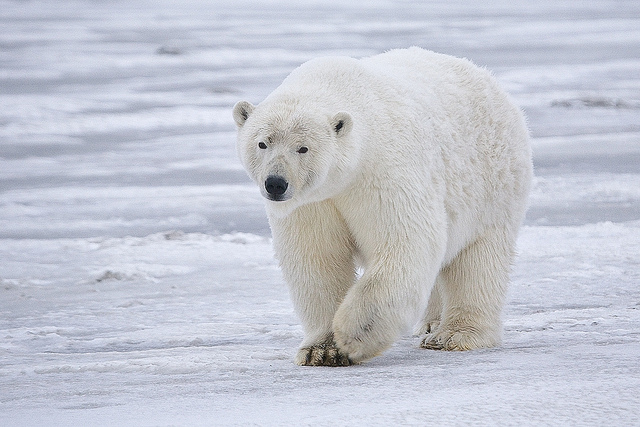With LIAM CALLANAN

Your name: Liam Callanan
Current city or town: Milwaukee
How long have you lived here? 10 years
With LIAM CALLANAN

Your name: Liam Callanan
Current city or town: Milwaukee
How long have you lived here? 10 years
By KURT CASWELL

Polar Bear (Sow), Near Kaktovik, Barter Island, Alaska
North of the Long Range Mountains in spring time, where the road swings east off the long northerly climb up the west coast, and a little farther on, back to the north again to the land’s end on the Northern Peninsula of Newfoundland, a place where Norsemen and women came ashore 500 years before Columbus, and the great icebergs, calved off the great Greenland ice sheet, march along the eastern shore with the currents of the North Atlantic: here, in this place, a polar bear passed by.

In this episode of The Common’s Contributors in Conversation podcast, editor-in-chief Jennifer Acker and Stephen O’Connor discuss “The Common Statement” and “Con” from Issue 07.
MELODY NIXON interviews STEPHEN O’CONNOR

Stephen O’Connor is a writer of fiction and nonfiction, the author of four books, a professor of creative writing at Columbia University and Sarah Lawrence College, and a husband and father. His short stories “Con” and “Double Life” appear in Issues 07 and 03 respectively of The Common. His new novel, Thomas Jefferson Dreams of Sally Hemings, is forthcoming from Viking-Penguin. Melody Nixon talked with O’Connor this month while she was in Norway and he in London. They both endured the rainiest of European springs and the crackling of Skype to talk dreams, the unconscious, and the right/ability of white writers to write across identity lines.
Book by MICHELLE BRAFMAN
Reviewed by

The title of Michelle Brafman’s debut novel, Washing the Dead, is taken from the sacred washing of a traditional Jewish burial ceremony. Volunteering for a washing, or tahara, is considered one of the most selfless deeds in Orthodox Judaism because the beneficiary cannot thank the participants. The book’s three sections are named for and center around different occasions of ritual washing in the life of the narrator, Barbara Blumfield, as she tries to fathom the family secrets that bind her to her Orthodox community and repel her. The first and last are taharas and the middle is a mikveh, a purifying immersion in water.
As a novel, the book explores redemption and forgiveness in three generations of splintered mother-daughter relationships, but what’s most compelling is what it reveals about Chasidic and Orthodox world of rituals and their rules for dealing with and avoiding the secular world.
The book alternates between the Barbara of the 1970s, an Orthodox teenager (née Pupnick) and the secular 50-something Barbara of 2009, who is married to a stockbroker and the mother of a teenage girl herself. The younger Barbara’s words come from letters she wrote but never sent, which her daughter discovers years later.
By GEOFF KRONIK

I was in Hamburg for a language course, and all week the syntactical floodwaters of German grammar had been rising. By Thursday night I was drowning in homework and would need Friday morning, before my afternoon class, to stay afloat.
Then the friend I was staying with, a German lawyer, suggested I join him in court the next morning. I could attend a session with him, see the German system, meet a German judge. An appealing prospect that alas would leave no time for homework.
The week of Freddie Gray’s funeral, after the rallies and the marches, after the west side ignites and the camera crews descend upon our city, the helicopters swarm in two clusters—one to the east side and one to the west, a steady thunking all-day-and-night stutter. It’s the sound of tension hovering—a sound that makes people stop on the sidewalks and stare up at the sky.
We live on a busy street of tall old houses between the two sides of the city that are being watched from the air and a couple miles north of the downtown tourist area of glass storefronts and office buildings, where a human wall of police officers and national guard troops stretch along the inner harbor, watching at eye level, men and women holding guns and shields with handfuls of coiled plastic handcuffs attached to their uniforms. We are surrounded by the noise of what’s happening, but we are removed from any sense of risk: we are not afraid of the police; we are not afraid of our neighbors; there is no merchandise being protected by force. It is an exaggerated version of how I often feel in Baltimore—safe but not far from people who do not feel safe.
This month we welcome a poet new to our pages: Colin Channer, whose work will also appear in Issue 10 (Fall 2015).
Book by ALICE OSWALD
Reviewed by

It’s possible to call a river an organ of speech. It has a mouth, and a source, and down the length of its body the sounds it makes go through physical transformations, changing the tones of its voice.
British poet Alice Oswald begins her book-length poem Dart by asserting this comparison between the poet’s voice and the river’s. She asserts that the people living along the Dart who lend their speech to the book’s personas function as “life-models from which to sketch out a series of characters—linking their voices into a sound-map of the river, a songline from the source to the sea… These do not refer to real people or even fixed fictions. All voices should be read as the river’s mutterings.”
This note gives just a glimpse of the complex labor of translation behind this work—one that surpasses the conventional personification of natural forms. Oswald, who spent two years recording the conversations of people who live and work on the Dart, set out to transform the voice of the river into English through the way its familiars talk.